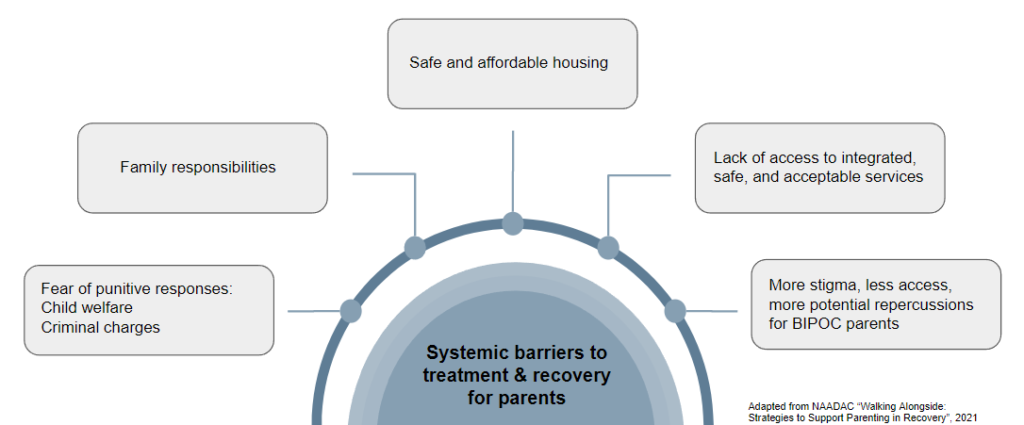Unit 5: Serving Families & Caregivers with Children
Overview
- Significance of family involvement in the recovery process
- Unique challenges for families and recovery homes
- Challenges for Families with Substance Exposed Newborns
- Maintaining a safe environment for children to visit
- Offering parent support resources
Significance of family involvement in recovery
- Support and encouragement: Family involvement provides crucial emotional support and encouragement to individuals in recovery. Having family members actively engaged in the recovery process can be a powerful motivator, as their presence and encouragement can boost the individual’s determination and resilience.
- Addressing underlying family dynamics: Through therapy, education, and support groups, families can work towards healthier communication, boundaries, and relationship dynamics, which can positively impact the recovery process.
- Education and skill building: Families can learn about the nature of addiction, relapse prevention strategies, and effective ways to support their loved ones in recovery.
- Relapse prevention and long term recovery: Families can identify potential triggers, learn how to provide healthy support, and recognize signs of relapse.
- Rebuilding and strengthening relationships: Recovery homes that involve families provide a structured and supportive environment for rebuilding and strengthening these relationships.
Significance of family involvement in recovery
Activity: Please watch this brief video from SAMHSA to better understand the role of family in recovery
Unique challenges for families in recovery

Notes:
- Finding appropriate housing options for families with children in need of sober living accommodations can be challenging.
- Many traditional sober living homes are designed primarily for individuals, which may not meet the specific needs of families.
- Limited availability of family-friendly sober living homes can result in long waiting lists and increased difficulty in accessing suitable housing.
Limited Availability of Sober Living Homes for Families:
- There is a scarcity of sober living homes that specifically accommodate children.
- Lack of child-friendly facilities and appropriate programming may restrict families from accessing supportive environments conducive to their recovery needs.
- This limited availability can further compound the challenges faced by parents seeking recovery while caring for their children.
Difficulty in Finding Affordable and Safe Housing Options:
- Financial constraints often pose obstacles for families seeking sober living accommodations.
- Affordable housing options that meet safety standards can be scarce, making it challenging for families to find suitable and affordable housing.
- High costs of rent and the additional expenses associated with child care and family needs may strain the financial resources of families in recovery.
Balancing Parental Responsibilities and Recovery:
- Parents in recovery face unique challenges in balancing their parental responsibilities while maintaining their own sobriety.
- Ensuring the well-being and safety of children while focusing on personal recovery requires additional support and resources.
- Parenting challenges related to establishing routines, setting boundaries, and addressing past parenting mistakes can arise during the recovery process.
Child Custody and Visitation Rights:
- Legal issues related to child custody and visitation rights can complicate the involvement of families in sober living homes.
- Parents in recovery may need to navigate complex legal processes to establish or maintain custody or visitation rights.
- Clear communication and collaboration between the sober living home, parents, and legal authorities are essential to ensure the well-being of children.
Unique challenges for families in recovery (Substance Exposed Newborns)
Mothers of substance exposed newborns (SEN) may encounter the following difficulties.
- Immediate challenges usually center around the infant’s health and well-being.
- Emotional distress
- Financial difficulties & legal issues
- Challenges with bonding and attachment.
With early intervention and support, many mothers and infants can overcome these challenges and thrive as family.
Parental Engagement in the Care of Substance-Exposed Newborns
Please watch this short video to learn more about SEN and how to support families with SEN.
Maintaining a safe environment for children to visit
- Refer back to Module 2 to learn more about creating a welcoming environment.
- Create a warm, inviting treatment environment that feels safe and accessible for family members of all ages
- Clean and well maintained environment
- Current background checks on residents
- Trauma informed: Refer back to Module 2, Unit 2 on how to integrate trauma informed care into the recovery environment.
Offering parent support resources
- Parenting skills training:
- Chicanos Por La Causa (CPLC) Parenting Education
- Child Crisis Arizona Family Education Program
- Child care resources (AHCCCS)
- Child Care Assistance
- Support groups
- Family counseling
- Personal financing and budgeting education
- Job/skill training
- Arizona@Work
Key Takeaways
Serving Families & Caregivers with Children
- Family plays an important role in recovery.
- Recognize the unique challenges families will face in the recovery home environment.
- Encourage families to participate in the recovery process.
RHAAZ Course Curriculum
Sources:
- Walking Alongside: Strategies to Support Parenting in Recovery (naadac.org)

